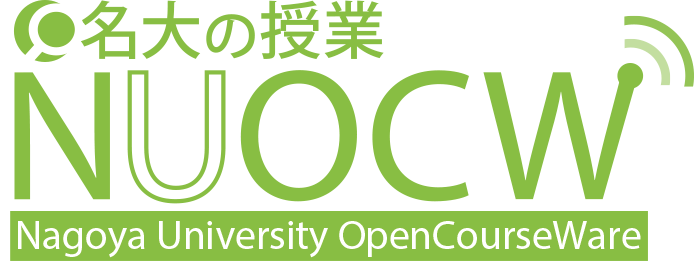英語-(基礎)-2015

| 講師 | Chad NILEP 准教授 |
|---|---|
| 開講部局 | 教養教育院 2015年度 前期 |
| 対象者 | 法学部 (1単位・週1回全15回) |
授業の目標
The objective of this course is to develop basic English reading and writing skills related to the study of university-level arts and sciences. The aim is to allow Nagoya University students to acquire the abilities appropriate for success in a research based university. Attention is given to paragraph structure as a key to logical text construction. For that reason, students learn about both reading for essential information as well as constructing convincing arguments in their own writing. Students broaden their abilities to read English materials, to write well organized paragraphs, and to use appropriate English expressions.
授業の工夫
Students read both extensively and intensively. For extensive reading, each student chooses books, magazines, news articles, or other material that interests her or him personally. Students read these materials every week, and write a journal to record how many pages they read, what new vocabulary they learned, and what ideas interested them. For intensive reading, students read one essay each week about world food ways, answer specific questions about this reading, and discuss that information in small groups.
The writing process includes thinking, preparing, writing, and revising. Each week in class students write a paragraph during 15 minutes of timed writing. Students read one another’s papers and comment on their form and clarity. Three of these paragraphs are revised on the basis of peer comments and then graded.
授業の内容
Students work on writing well-structured paragraphs and practice a writing process that includes preparing, writing, and revising to improve written work. Every week in class students practice writing a paragraph very quickly. Three of these paragraphs are rewritten and submitted for a grade. Students also read extensively outside of class in addition to reading in class. Students learn about world cultures by reading and writing about food ways.
The course is taught entirely in English. Students are required to participate actively in class discussions and to write paragraphs in English. Grades are based not only on English language ability but also on control of writing forms such as proper topic sentences and paragraph structure.
教科書
Hungry Planet: What the World Eats. Peter Menzel, Faith D’Aluiso, Tomoyuki Tsuruoka and Yoshiaki Sato. Shohakusha, ISBN 978-4-88198-601-1.
スケジュール
| 回 | 講義内容 |
|---|---|
| 1 | Class introduction. Food in Australia |
| 2 | Timed writing; Topic sentences. Food in Chad |
| 3 | Brainstorming. Food in China |
| 4 | Revising and editing. Food in Cuba |
| 5 | Supporting the topic; Reading journal check 1. Food in France |
| 6 | Unity in writing; Revised paper 1 due. Food in Germany |
| 7 | Common mistakes |
| 8 | Using an outline |
| 9 | Outline for revising |
| 10 | Coherence |
| 11 | Transition signals; Revised paper 2 due. Food in Kuwait |
| 12 | Logic in academic writing. Food in Mexico |
| 13 | Papers with several paragraphs. Food in Mongolia |
| 14 | The writing process. Food in Turkey |
| 15 | Course wrap-up and final review. Final projects due. Food in America |
講義資料
week1
week2
week3
week4
week5
week6
week7
week8
week9
week10
week11
week12
week13
week14
成績評価
Course grade is based on written assignments, a reading journal, self-study, and work in class including timed writing and group work.
投稿日
April 29, 2020
